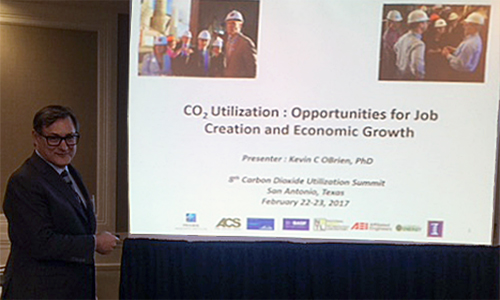
Emerging technologies for carbon dioxide (CO2) utilization present significant opportunities for job creation and economic growth, said Kevin O’Brien, director of the Illinois Sustainable Technology Center (ISTC), a division of the Prairie Research Institute at the University of Illinois at Urbana-Champaign, in a presentation to the Eighth Carbon Dioxide Utilization Summit Feb. 22 in San Antonio, Texas.
But success in deriving those benefits from carbon utilization depends on the assets (economic and human) of each particular region, O’Brien emphasized to energy, chemical, plastics, and construction industry leaders at the conference.
Mature regional partnerships for workforce development, higher education, economic development, government support, and responsive research and development capabilities are some of the factors that contribute to development of a sustainable CO2 value chain.
O’Brien pointed to reasons why Illinois, where coal underlies nearly the entire state and remains a $2.5 billion annual industry, is seizing on every advantage it has to align with the potential of carbon utilization innovations.
- Illinois research universities have leading programs in engineering, engineering geology, carbon capture, and other scientific innovation. One example is the use of CO2 as a fertilizer substitute at the University of Illinois. In a major agricultural state with nutrient loss problems and where the climate is expected to reduce carbon retention in soil, synergies abound.
- College curricula, community colleges, economic development professionals, political leaders, and employers are already connected to existing supply chains.
- The University of Illinois’ Prairie Research Institute, ISTC’s parent organization, has assembled decades-long reservoirs of valuable data on Illinois weather, regional climate, soil, groundwater, stream flow, and other factors that is relevant to an economic pivot toward carbon utilization.
On the research front, a Midwest Regional Approach to Carbon Utilization workshop is being planned for June 28 by co-organizers ISTC, the Gas Technology Institute, and the Advanced Coal and Energy Research Center of Southern Illinois University-Carbondale.
Other regions will have different assets and opportunities. For instance, carbon utilization will necessitate pipelines or another cost-effective transportation method for captured CO2. Markets with a track record for facilitating transportation will be ahead of the game, O’Brien said.

